RICE and ITS Water: A Terrific Crisis Companion!
I’m a big believer in the concept that if I’m prepared (for whatever), I need not fear. It’s with this thought in mind that I share something really SIMPLE that can play a huge role in your being better prepared—in this case, for disasters. This information came to me from www.beprepared.com, a company that sells emergency essentials.
Their preparedness experts explain that first of all, it’s wise to choose food products and emergency gear that can serve more than one purpose. Versatility in your preparedness stockpile saves space, making room for more resources. Plus, evaluating all the ways you can use and reuse your supplies will help you make the most of what you have.
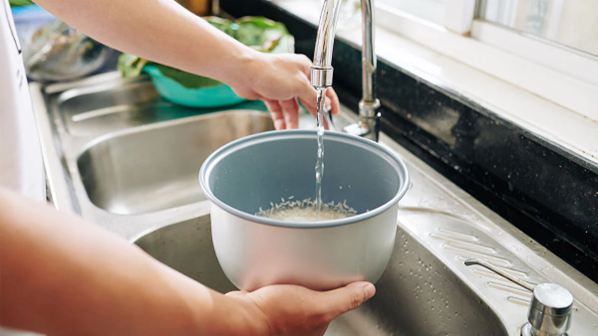
Second, remember that simple solutions are always best. Rice is a food that checks both items off the list (versatile and simple). Because it’s a food with a long shelf life that can be mixed into all sorts of meals, this energy-filled complex carbohydrate makes an excellent addition to an emergency food supply.
But here’s the scoop: The water left behind after preparing rice is just as versatile and valuable as rice itself! This water is about 80 to 90 percent starch. Rice water can be used for all sorts of ailments, home maintenance and wellness boosts. It’s loaded with benefits. For instance:
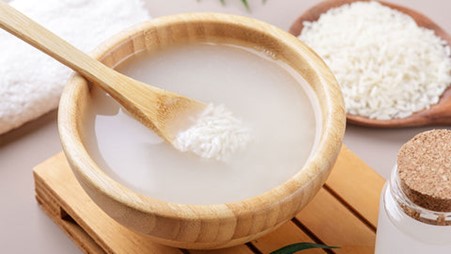
Because rice is such a bland starch, rice water can soothe an upset stomach. It does a thorough job of calming the cramping that comes with a stomach bug. And it also alleviates nausea, bloating, constipation, and diarrhea.
If you’re ill and not feeling up to eating, rice water is a good alternative to a meal. It provides nutrition without stirring up the stomach. For those who struggle to eat in general, rice water can take on a gruel-like consistency. This makes it easier to sustain those who have a hard time swallowing or feeding themselves.

Rice water is an effective way to protect against dehydration, too (a common problem when suffering with the flu or other stomach problems). Dehydration can lead to debilitating side effects. Studies show rice water can work just as well as electrolyte solutions! So, think about this: during times when pharmacies have limited supplies or are closed altogether, having rice water on hand can be a God-send.
Another good reason to save your rice water is for the thickening it provides when making sauces, soups, and stews. You’ll end up with a more robust, richer flavored dish.
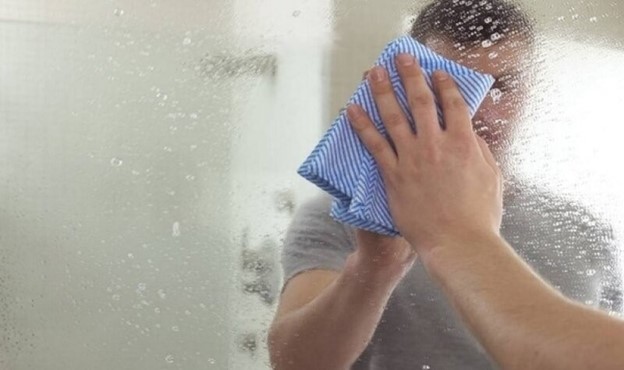
When not cooking with it, you can also clean with it. To clean glass and mirrors, pour rice water into a spray bottle. Spray the surface you intend to clean, then wipe it all away with a dry cloth. To wash dishes, use rice water in place of standard dish soap. While this solution should work well in most cases (the only exception is heavy greasy residue).
Rice water can also play an important role in growing a garden (another essential step toward self-sufficiency and food security). It’s rich in nutrients making it a perfect natural fertilizer.
It’s not just good for plants, it’s good for the face and hair, as well. Since rice water is a cleansing agent, it’s a great facial cleanser (especially effective on acne). Just cleanse with rice water, then rinse with warm water. And be sure to rinse your hair in it. It’s the perfect natural detangler and will make your hair stronger, add shine, and protect the color.
Sold on the benefits of rice water? Me too. So let’s make some, using either of these 3 easy methods:
BOILING.
The remaining milky liquid is rice water.
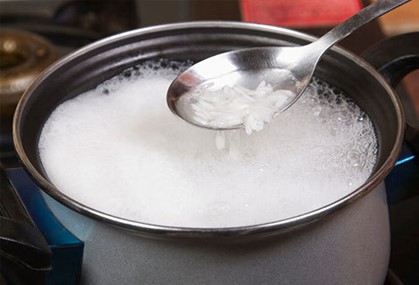
For thicker rice water, boil the rice longer than usual. To thin it, add more water. Be sure to let it cool before using, especially for medicinal purposes. It can be consumed warm or cold, and will keep refrigerated for a few weeks. I intend to freeze it in my ice cube tray and then transfer the cubes to a zippered freezer bag.
SOAKING.
FERMENTING.
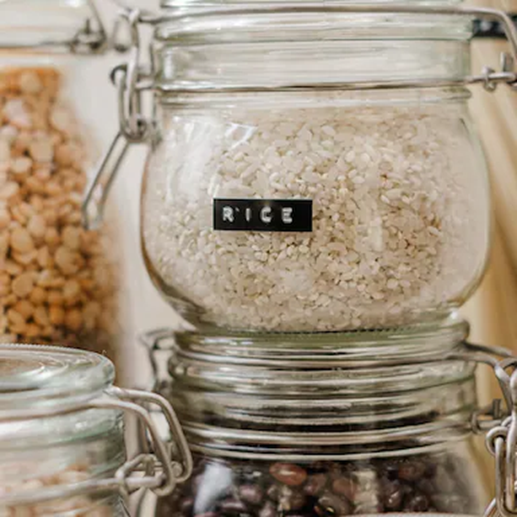
Rice and its water really is a terrific crisis companion. As you build your preparedness pantry, add rice to the top of the list!
Their preparedness experts explain that first of all, it’s wise to choose food products and emergency gear that can serve more than one purpose. Versatility in your preparedness stockpile saves space, making room for more resources. Plus, evaluating all the ways you can use and reuse your supplies will help you make the most of what you have.

Second, remember that simple solutions are always best. Rice is a food that checks both items off the list (versatile and simple). Because it’s a food with a long shelf life that can be mixed into all sorts of meals, this energy-filled complex carbohydrate makes an excellent addition to an emergency food supply.
But here’s the scoop: The water left behind after preparing rice is just as versatile and valuable as rice itself! This water is about 80 to 90 percent starch. Rice water can be used for all sorts of ailments, home maintenance and wellness boosts. It’s loaded with benefits. For instance:

Because rice is such a bland starch, rice water can soothe an upset stomach. It does a thorough job of calming the cramping that comes with a stomach bug. And it also alleviates nausea, bloating, constipation, and diarrhea.
If you’re ill and not feeling up to eating, rice water is a good alternative to a meal. It provides nutrition without stirring up the stomach. For those who struggle to eat in general, rice water can take on a gruel-like consistency. This makes it easier to sustain those who have a hard time swallowing or feeding themselves.

Rice water is an effective way to protect against dehydration, too (a common problem when suffering with the flu or other stomach problems). Dehydration can lead to debilitating side effects. Studies show rice water can work just as well as electrolyte solutions! So, think about this: during times when pharmacies have limited supplies or are closed altogether, having rice water on hand can be a God-send.
Another good reason to save your rice water is for the thickening it provides when making sauces, soups, and stews. You’ll end up with a more robust, richer flavored dish.

When not cooking with it, you can also clean with it. To clean glass and mirrors, pour rice water into a spray bottle. Spray the surface you intend to clean, then wipe it all away with a dry cloth. To wash dishes, use rice water in place of standard dish soap. While this solution should work well in most cases (the only exception is heavy greasy residue).
Rice water can also play an important role in growing a garden (another essential step toward self-sufficiency and food security). It’s rich in nutrients making it a perfect natural fertilizer.
It’s not just good for plants, it’s good for the face and hair, as well. Since rice water is a cleansing agent, it’s a great facial cleanser (especially effective on acne). Just cleanse with rice water, then rinse with warm water. And be sure to rinse your hair in it. It’s the perfect natural detangler and will make your hair stronger, add shine, and protect the color.
Sold on the benefits of rice water? Me too. So let’s make some, using either of these 3 easy methods:
BOILING.
- Pour 2 tablespoons of rice and 1 cup of water into a pot (water only—no salt, butter, or anything else).
- Bring the water to a boil.
- Boil the rice until it is tender.
- Strain the rice and add it to soup, casserole, or another meal as intended.
The remaining milky liquid is rice water.

For thicker rice water, boil the rice longer than usual. To thin it, add more water. Be sure to let it cool before using, especially for medicinal purposes. It can be consumed warm or cold, and will keep refrigerated for a few weeks. I intend to freeze it in my ice cube tray and then transfer the cubes to a zippered freezer bag.
SOAKING.
- Thoroughly rinse 1/2 cup of uncooked rice.
- Pour the rice into a bowl along with 2 to 3 cups of water.
- Leave the rice to soak for 30 minutes.
- Strain the remaining rice water into a clean bowl.
FERMENTING.
- Thoroughly rinse 1/2 cup of uncooked rice.
- Pour the rice into a bowl along with 2 to 3 cups of water.
- Leave the rice to soak and stand at room temperature for up to 2 days.
- Strain the remaining rice water into a clean bowl.

Rice and its water really is a terrific crisis companion. As you build your preparedness pantry, add rice to the top of the list!
 Alice Osborne
Alice Osborne
Weekly Newsletter Contributor since 2006
Email the author! alice@dvo.com
